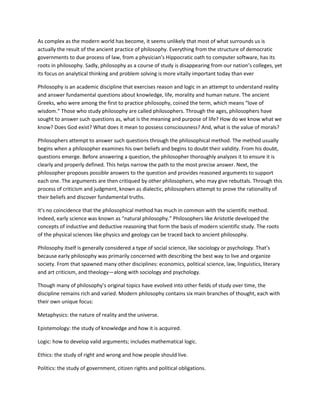
Importance of Philosophy in the Modern World
- 1. As complex as the modern world has become, it seems unlikely that most of what surrounds us is actually the result of the ancient practice of philosophy. Everything from the structure of democratic governments to due process of law, from a physician’s Hippocratic oath to computer software, has its roots in philosophy. Sadly, philosophy as a course of study is disappearing from our nation’s colleges, yet its focus on analytical thinking and problem solving is more vitally important today than ever Philosophy is an academic discipline that exercises reason and logic in an attempt to understand reality and answer fundamental questions about knowledge, life, morality and human nature. The ancient Greeks, who were among the first to practice philosophy, coined the term, which means “love of wisdom.” Those who study philosophy are called philosophers. Through the ages, philosophers have sought to answer such questions as, what is the meaning and purpose of life? How do we know what we know? Does God exist? What does it mean to possess consciousness? And, what is the value of morals? Philosophers attempt to answer such questions through the philosophical method. The method usually begins when a philosopher examines his own beliefs and begins to doubt their validity. From his doubt, questions emerge. Before answering a question, the philosopher thoroughly analyzes it to ensure it is clearly and properly defined. This helps narrow the path to the most precise answer. Next, the philosopher proposes possible answers to the question and provides reasoned arguments to support each one. The arguments are then critiqued by other philosophers, who may give rebuttals. Through this process of criticism and judgment, known as dialectic, philosophers attempt to prove the rationality of their beliefs and discover fundamental truths. It’s no coincidence that the philosophical method has much in common with the scientific method. Indeed, early science was known as “natural philosophy.” Philosophers like Aristotle developed the concepts of inductive and deductive reasoning that form the basis of modern scientific study. The roots of the physical sciences like physics and geology can be traced back to ancient philosophy. Philosophy itself is generally considered a type of social science, like sociology or psychology. That’s because early philosophy was primarily concerned with describing the best way to live and organize society. From that spawned many other disciplines: economics, political science, law, linguistics, literary and art criticism, and theology—along with sociology and psychology. Though many of philosophy’s original topics have evolved into other fields of study over time, the discipline remains rich and varied. Modern philosophy contains six main branches of thought, each with their own unique focus: Metaphysics: the nature of reality and the universe. Epistemology: the study of knowledge and how it is acquired. Logic: how to develop valid arguments; includes mathematical logic. Ethics: the study of right and wrong and how people should live. Politics: the study of government, citizen rights and political obligations.
- 2. Aesthetics: beauty, art and artistic perception. At first glance, it would appear that such study has little application in the real world. Yet, philosophy shapes modern existence. Unlocking the secrets of knowledge acquisition is the primary concern of passionate educators of young people around the globe. Logic forms the basis of all computer technology, as more precise programming commands increase computing speed and efficiency. Ethics plays a major role in medicine, law and foreign policy. Indeed, the hottest debates surrounding the issues of our time—abortion, capital punishment, welfare, environmentalism, torture and end-of-life care—all stem from philosophical questions. However, the study of philosophy is not necessarily about discovering all of the answers to life’s toughest questions. Skepticism lies at the heart of philosophy. Therefore, asking a question is more fundamentally important than answering one. In philosophy, questioning a deeply held belief or social practice sets one onto the path of true understanding, and it’s this understanding that leads to meaningful personal and social change. A good philosopher recognizes the danger of accepting knowledge at face value. Social or scientific theories may be untested or contain personal bias; trusting them immediately could result in terrible consequences. Today, philosophers can be found working in nearly every career field. Some are scientists developing ways to test household products without using animals. Some are politicians and human rights activists fighting for changes in foreign policy that will alleviate war and poverty for millions of Third World citizens. Some are economists seeking practical solutions to economic inequality. Still others are programmers working on the cutting edge of technology to develop faster and more efficient computer software. Those who study philosophy also tend to lead fulfilling and successful lives. Some of history’s most well- known figures were philosophers: Socrates, Plato, John Locke, Friedrich Nietzsche, John Stuart Mill, Adam Smith, Karl Marx and Noam Chomsky, to name a few.